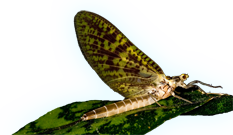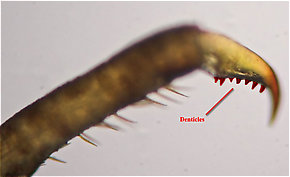Blog & Latest Updates
Fly Fishing Articles
Insects by Common Name

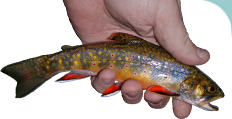
Ephemerella needhami (Little Dark Hendrickson) Mayfly Nymph Pictures
Classification
Kingdom
Animalia (Animals)
» Phylum
Arthropoda (Arthropods)
» Class
Insecta (Insects)
» Order
Ephemeroptera (Mayflies)
» Species
needhami (Little Dark Hendrickson)
I took quite a few notes at the microscope when I collected this specimen. They're attached to the appropriate pictures.
I found this specimen in the same collection as a similar one. Since I only have strange views of this one, it's possible that they're actually the same specimen and I somehow confused my picture-ordering and got the impression that they're different nymphs.
This mayfly was collected from the Namekagon River on June 8th, 2005 and added to Troutnut.com on May 26th, 2006.

There are postero-lateral (Lateral: To the side.) projections on adominal segments 4-9.
AuthorTroutnut
CameraCanon EOS 20D

There are fairly prominent tubercles (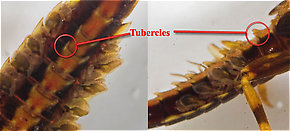 Tubercle: Various peculiar little bumps or projections on an insect. Their character is important for the identification of many kinds of insects, such as the nymphs of Ephemerellidae mayflies.) on abdominal segments 2-8, and none on segments 1, 9, and 10, not even at high magnification.
Tubercle: Various peculiar little bumps or projections on an insect. Their character is important for the identification of many kinds of insects, such as the nymphs of Ephemerellidae mayflies.) on abdominal segments 2-8, and none on segments 1, 9, and 10, not even at high magnification.

A few (not all) of the abdominal tubercles on this Ephemerella needhami nymph are circled. They are especially large in this species.
AuthorTroutnut
CameraCanon EOS 20D

The maxillary palp (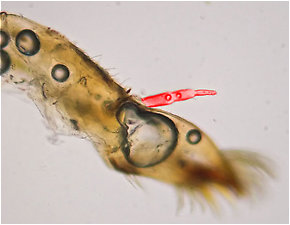 Palp: A long, thin, often segmented appendage which can protrude from certain insect mouth parts such as the maxillae. Also known as the < />palpus.) is 3-segmented and, in this photo, rather blurry.
Palp: A long, thin, often segmented appendage which can protrude from certain insect mouth parts such as the maxillae. Also known as the < />palpus.) is 3-segmented and, in this photo, rather blurry.

The palp on the maxilla of an Ephemerella nymph (detached and photographed under a microscope) is highlighted in red here.
AuthorTroutnut
CameraCanon EOS 20D

The fore tarsal claw (Tarsal claw: The claws at the tip of the tarsus, on an insect's "foot.") has 7 denticles (Denticle: Small tooth-like projects, often appearing like serrations on the tarsal claws of certain mayfly nymphs.).
AuthorTroutnut
CameraCanon EOS 20D
Start a Discussion of this Nymph:
Top 10 Fly Hatches
Top Gift Shop Designs
Eat mayflies.
Top Insect Specimens
Miscellaneous Sites
Troutnut.com is copyright © 2004-2024 Jason
Neuswanger (email Jason). See my FAQ for information about use of my images.
 privacy policy
privacy policy
